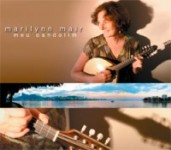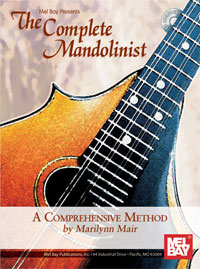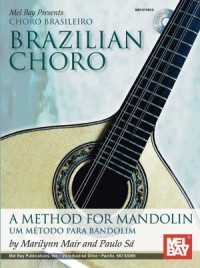 Life in Rio continues pra mim, full of music and friends. The last log ended just before the great choro-fest week-end, so I’ll start this episode back there in April. The concert venue, Circo Voador, is an outdoor rock amphitheater just inside the Arcos do Lapa withpalm trees, bars, a stage, some bleachers, and alot of open space for standing or dancing. My friend Betty
Life in Rio continues pra mim, full of music and friends. The last log ended just before the great choro-fest week-end, so I’ll start this episode back there in April. The concert venue, Circo Voador, is an outdoor rock amphitheater just inside the Arcos do Lapa withpalm trees, bars, a stage, some bleachers, and alot of open space for standing or dancing. My friend Betty  & I take the metro there early in the day to get tickets and check out the location before dark, as I haven’t been there yet. The Arcos, that you see in the first pic, date from the 18th century and are a copy of a Roman aqueduct, built originally to carry water but now used as a track for the “bondinho” (little train) to Santa Teresa, and they have become the defining landmark of the Lapa neighborhood. Afterwards we walk around the streets near the Cinelandia metro station, home to the Municipal Theater, the National Library, Escola da Musica and many other public buildings.
& I take the metro there early in the day to get tickets and check out the location before dark, as I haven’t been there yet. The Arcos, that you see in the first pic, date from the 18th century and are a copy of a Roman aqueduct, built originally to carry water but now used as a track for the “bondinho” (little train) to Santa Teresa, and they have become the defining landmark of the Lapa neighborhood. Afterwards we walk around the streets near the Cinelandia metro station, home to the Municipal Theater, the National Library, Escola da Musica and many other public buildings.
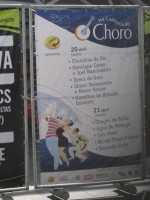 We’re meeting friends from NYC – Luiz Simas, Brazilian pianist and composer, & his wife Maria – for dinner at my local restaurant, the Garota da Urca, and afterwards we catch a cab together to the concert. My choro-school friend Ray is already there, and makes room for us all at the table he was early enough to snag. There are 5 acts playing each night of the festival, most of them groups whose recordings I have and love. The opening act the first night is a flute ensemble that is already on as we arrive. But I’m waiting for the second set, with my beloved bandolim teacher Joel
We’re meeting friends from NYC – Luiz Simas, Brazilian pianist and composer, & his wife Maria – for dinner at my local restaurant, the Garota da Urca, and afterwards we catch a cab together to the concert. My choro-school friend Ray is already there, and makes room for us all at the table he was early enough to snag. There are 5 acts playing each night of the festival, most of them groups whose recordings I have and love. The opening act the first night is a flute ensemble that is already on as we arrive. But I’m waiting for the second set, with my beloved bandolim teacher Joel 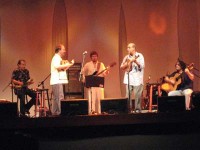 Nascimento, playing with choro-legend Henrique Cazes on cavaquinho. Their band has percussion, electric bass, and Rogerio Caetano on 7-string, and they play a great set. It’s interesting to hear Joel fit his very personal rubato-filled style into a band setting, keeping all the ornaments and virtuoso runs and interacting with the other musicians, as I’ve gotten so used to hearing him play solo at my lessons.
Nascimento, playing with choro-legend Henrique Cazes on cavaquinho. Their band has percussion, electric bass, and Rogerio Caetano on 7-string, and they play a great set. It’s interesting to hear Joel fit his very personal rubato-filled style into a band setting, keeping all the ornaments and virtuoso runs and interacting with the other musicians, as I’ve gotten so used to hearing him play solo at my lessons.
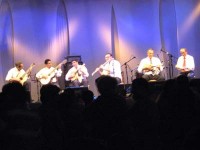 Jacob’s former band, Epouca de Ouro, is on 3rd, continuing the thread of traditional choro, and sounding as perfect as they had at Bar do Tom in March. I will mention here that this concert started at 10:00 PM, so as we reach the end of the 3rd set it’s already well past 1:00 AM, and we’ve heard a lot of great music. The 4th set is Gilson Peranzzetta, piano, with Mauro Senise, flute and sax, playing an interesting but very mellow modern jazz that seems to barely have a foot in choro. It’s an odd choice to follow the energy of the previous two bands. But then, at about 2:30 AM, the headline group – the
Jacob’s former band, Epouca de Ouro, is on 3rd, continuing the thread of traditional choro, and sounding as perfect as they had at Bar do Tom in March. I will mention here that this concert started at 10:00 PM, so as we reach the end of the 3rd set it’s already well past 1:00 AM, and we’ve heard a lot of great music. The 4th set is Gilson Peranzzetta, piano, with Mauro Senise, flute and sax, playing an interesting but very mellow modern jazz that seems to barely have a foot in choro. It’s an odd choice to follow the energy of the previous two bands. But then, at about 2:30 AM, the headline group – the 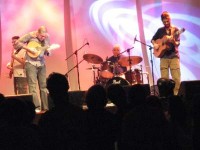 Hamilton de Holanda Quinteto – takes the stage. It’s loud, it’s rock, Hamilton is bouncing around the stage with his bandolim, backed by electric guitar, harmonica, electric bass & drums. A galvanizing set for the 20-something crowd who stand up and cheer and dance. Unfortunately by now I am so tired I can barely see straight & have choro school at 9:00 AM, so shortly after 3:00, even though Hamilton continues on, we call TaxiPaulo to come get us. He shows up on foot, having parked the cab where he could, so we get to walk through the mysterious back alleys of Lapa with smokey food stands and sleeping street people before riding home.
Hamilton de Holanda Quinteto – takes the stage. It’s loud, it’s rock, Hamilton is bouncing around the stage with his bandolim, backed by electric guitar, harmonica, electric bass & drums. A galvanizing set for the 20-something crowd who stand up and cheer and dance. Unfortunately by now I am so tired I can barely see straight & have choro school at 9:00 AM, so shortly after 3:00, even though Hamilton continues on, we call TaxiPaulo to come get us. He shows up on foot, having parked the cab where he could, so we get to walk through the mysterious back alleys of Lapa with smokey food stands and sleeping street people before riding home.
Saturday is Betty’s last day in Rio, and Henrique picks her up early to see some more of the city while I’m at choro-school. I miss my early repertory class – can’t prop the eyelids open in time – and find, when I get to Bandolim class, that Luiz Barcelos, the Trapiche hot-shot is subbing for Pedro Amorim. I’ve forgotten my recorder, and it’s incredibly hot, and the noise of the Botofogo Air Show planes as they scream overhead is intense. Bandao is cancelled, as are the afternoon regional rehearsals, because the teachers are giving a concert that we’re all invited  to at 6:00. But I do get my official bandolim-student ID card! And although afternoon rehearsals have been cancelled, our regional decides to stay and play a little anyway. I leave around 1:30 to go home to meet Betty when she comes back to collect her stuff before leaving for the airport. As I start walking home, however, it becomes increasingly apparent that we have seriously miscalculated the impact of the Botofogo Air Show on our plans. The streets of Urca are jammed with people and gridlock traffic. I find out later that over a million people are here for the event, taking place over the bay between Urca & Botofogo. As I slowly push my tired body through the mass of people watching from our side, I realize that Henrique and Betty are most likely completely unaware of situation here. I call to warn them to start back right away & not to try to drive into Urca, and tell them I’ll pull Betty’s luggage out of Urca & meet them by UniRio.
to at 6:00. But I do get my official bandolim-student ID card! And although afternoon rehearsals have been cancelled, our regional decides to stay and play a little anyway. I leave around 1:30 to go home to meet Betty when she comes back to collect her stuff before leaving for the airport. As I start walking home, however, it becomes increasingly apparent that we have seriously miscalculated the impact of the Botofogo Air Show on our plans. The streets of Urca are jammed with people and gridlock traffic. I find out later that over a million people are here for the event, taking place over the bay between Urca & Botofogo. As I slowly push my tired body through the mass of people watching from our side, I realize that Henrique and Betty are most likely completely unaware of situation here. I call to warn them to start back right away & not to try to drive into Urca, and tell them I’ll pull Betty’s luggage out of Urca & meet them by UniRio.
At this point the surreality of the exhaustion-tinged day just tips right over into the Salvador-Dali zone. I drag a wheeled duffle etc. through shoulder-to-shoulder crowds in meltingly-hot temperatures checking in at intervals on the cell with H&B, who are stuck in gridlock traffic in Botofogo on their way back from peaceful Sta. Teresa. Traffic is still a mess by UniRio, so I turn right & keep walking to a spot they can turn around and head back out before hitting the clogged 1-way streets, hoping that I have managed to locate all of Betty’s stuff and that she will not miss her plane. Somewhat amazingly my plan works, I flag them down, we throw the bags in the car and Henrique sets off on a roundabout way to the airport. As he says with a rueful shake of his head, never in our wildest dreams did any of us think an airshow would be such a huge event.
 I go by myself to the 2nd night of the choro-fest, but Ray has saved me a seat, and Romulo and Raphael from my regional are there as well, although I don’t find them until partway through. The first set is a stripe-shirt/straw-hat bunch who do a theatrical choro set with jokes that border on corney. Next up is Agua de Moringa, a group I’m really excited to hear live. Three of the teachers from choro-school play in it – Marcilio Lopes, bandolim – my stand-partner at Bandao; Jayme Vignole, cavaquinho, and Rui Alvim – he of the meltingly beautiful tone – on clarinet and sax. Jayme & Rui both play at Trapiche as well. The band also includes 6 & 7-string guitars and a drummer, and they play a galvanizing set. I see Romulo after it & tell him I want us to BE Agua de M. According to Ray, Jaime does most of the arrangements and they are stellar. They play a piece written by Joel and I find out later that they are recording an entire CD of Joel’s music.
I go by myself to the 2nd night of the choro-fest, but Ray has saved me a seat, and Romulo and Raphael from my regional are there as well, although I don’t find them until partway through. The first set is a stripe-shirt/straw-hat bunch who do a theatrical choro set with jokes that border on corney. Next up is Agua de Moringa, a group I’m really excited to hear live. Three of the teachers from choro-school play in it – Marcilio Lopes, bandolim – my stand-partner at Bandao; Jayme Vignole, cavaquinho, and Rui Alvim – he of the meltingly beautiful tone – on clarinet and sax. Jayme & Rui both play at Trapiche as well. The band also includes 6 & 7-string guitars and a drummer, and they play a galvanizing set. I see Romulo after it & tell him I want us to BE Agua de M. According to Ray, Jaime does most of the arrangements and they are stellar. They play a piece written by Joel and I find out later that they are recording an entire CD of Joel’s music.
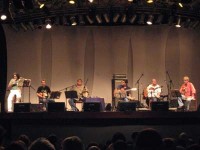 The next set features Galo Preta, with Alfonso Machado on bandolim, one of the old-school groups that first began the move to modernize choro improvisational style. Their set seems tame compared to AdeM’s – lovely, but without the fire that sets a great group apart from a good one. But another great group plays the set that follows. No Em Pingo d’Agua is a band of
The next set features Galo Preta, with Alfonso Machado on bandolim, one of the old-school groups that first began the move to modernize choro improvisational style. Their set seems tame compared to AdeM’s – lovely, but without the fire that sets a great group apart from a good one. But another great group plays the set that follows. No Em Pingo d’Agua is a band of 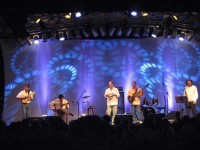 extraordinary players whose energy is palpable. Rodrigo Lessa on bandolim, Rogerio Sousa, 7-string, Celsinho on pandeiro (with occasional added cymbal), electric bass, and Mario Seve on sax – they set up with the soloists on either end and Celsinho in the center holding down the groove. A big wow.
extraordinary players whose energy is palpable. Rodrigo Lessa on bandolim, Rogerio Sousa, 7-string, Celsinho on pandeiro (with occasional added cymbal), electric bass, and Mario Seve on sax – they set up with the soloists on either end and Celsinho in the center holding down the groove. A big wow.
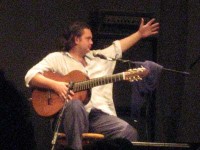 By now it’s well after 2 AM, and the headliner, Yamandu, has yet to hit the stage. Just as Y starts his set, Marcia appears & says that Igor called her & there’s a roda in Petropolis tomorrow at ~noon and she should bring me too. Cool! We agree to meet at the Rodoviaria in the morning to catch the bus together. I return my attention to Y, who starts off playing solo & then brings 2 other guitars to the stage – Rogerio Caetano, of the Trapiche sessions, and Ze Paulo Becker, of Trio Madeira. Unfortunately the sound system is turned up so loud it hurts, so after about a half-hour Ray & I decide it’s time to go & catch a cab.
By now it’s well after 2 AM, and the headliner, Yamandu, has yet to hit the stage. Just as Y starts his set, Marcia appears & says that Igor called her & there’s a roda in Petropolis tomorrow at ~noon and she should bring me too. Cool! We agree to meet at the Rodoviaria in the morning to catch the bus together. I return my attention to Y, who starts off playing solo & then brings 2 other guitars to the stage – Rogerio Caetano, of the Trapiche sessions, and Ze Paulo Becker, of Trio Madeira. Unfortunately the sound system is turned up so loud it hurts, so after about a half-hour Ray & I decide it’s time to go & catch a cab.
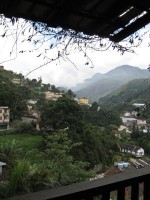 The next morning, Sunday, seems to arrive very early and Marcia & I get to the Rodoviaria just in the nick of time to catch the 11:40 bus to Petropolis. We meet the rest of her band & go to a small theater/restaurant that is holding the roda in honor of St. George’s Day, and Pixinguinha’s birthday (April 23). I always thought St. George was Brit, but apparently he’s very important to Brasil – important enough that everyone gets Monday off. The band includes my duo-partner Igor on 7-string, Marcia on pandeiro, and 3 others whose names I don’t have on sax, flute, and cavaquinho.
The next morning, Sunday, seems to arrive very early and Marcia & I get to the Rodoviaria just in the nick of time to catch the 11:40 bus to Petropolis. We meet the rest of her band & go to a small theater/restaurant that is holding the roda in honor of St. George’s Day, and Pixinguinha’s birthday (April 23). I always thought St. George was Brit, but apparently he’s very important to Brasil – important enough that everyone gets Monday off. The band includes my duo-partner Igor on 7-string, Marcia on pandeiro, and 3 others whose names I don’t have on sax, flute, and cavaquinho.
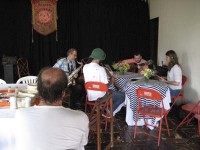 The host theater has prepared a feijoada – beans, sausage, rice, farofa – a dish usually served on week-ends and holidays. Everyone who comes pays an admission that covers food & music & the musicians eat for free. The roda is a blast as the band is very funny and fun and play really well. I have a good time making up counterlines, or playing chords, and occasionally play melody on a tune I know. I call Henrique to surprise him that I’m in his hometown & he comes over for awhile. Paulo Sa was supposed to play as well, but can’t come as his son Miguel has had a accident, but we talk later on the phone and all is well with Miguel. There are lots of percussion instruments at the theater so the roda later segues into a singing/drum jam, and at one point I’m playing a beer can with Marcia`s keys. Marcia is staying over as the band has rehearsal tomorrow, but my band is rehearsing too, so I catch the bus back to Rio.
The host theater has prepared a feijoada – beans, sausage, rice, farofa – a dish usually served on week-ends and holidays. Everyone who comes pays an admission that covers food & music & the musicians eat for free. The roda is a blast as the band is very funny and fun and play really well. I have a good time making up counterlines, or playing chords, and occasionally play melody on a tune I know. I call Henrique to surprise him that I’m in his hometown & he comes over for awhile. Paulo Sa was supposed to play as well, but can’t come as his son Miguel has had a accident, but we talk later on the phone and all is well with Miguel. There are lots of percussion instruments at the theater so the roda later segues into a singing/drum jam, and at one point I’m playing a beer can with Marcia`s keys. Marcia is staying over as the band has rehearsal tomorrow, but my band is rehearsing too, so I catch the bus back to Rio.
For some reason our band has decided to rehearse at 10:30 in the morning, so we’re all at Carlos’ in Sta Teresa bright and early, and have a good session. Afterwards I catch a cab home, pointing out to Romulo that it’s expensive to be this tired as it seems impossibly difficult to navigate the metro/bus home. Later in the afternoon I meet Luiz & Maria back in Urca, as they want to walk around the neighborhood a bit. Luiz’ mother, who lives in Ipanema, says Urca is a miracle, because it has no highrises or big hotels, it’s still a small community even with its incredible location. Luiz says Urca looks like he remembers Rio used to be. Once again I feel incredibly lucky to be able to live here.
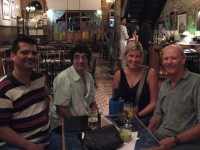 Tuesday arrives, and with it the session at Trapiche – Ray’s last as he’s scheduled to fly back to Vancouver on Thursday. It’s quite a different band this week, with Marcilio playing bandolim instead of LuizB, and Rogerio Sousa on 7-string. But it’s somehow fitting as they’re both good friends of Ray’s. There’s a pic of the 3 plus an Oz friend of Ray’s who’s spending some time in Rio. Eduardo Neves is also missing from the session but Rui is there and sounds great.
Tuesday arrives, and with it the session at Trapiche – Ray’s last as he’s scheduled to fly back to Vancouver on Thursday. It’s quite a different band this week, with Marcilio playing bandolim instead of LuizB, and Rogerio Sousa on 7-string. But it’s somehow fitting as they’re both good friends of Ray’s. There’s a pic of the 3 plus an Oz friend of Ray’s who’s spending some time in Rio. Eduardo Neves is also missing from the session but Rui is there and sounds great.
Joel has pushed my lesson back from Wednesday to Thursday, as he has a recording session, so I take the opportunity to catch the early choro show at Modern Sound – it’s 6-9 and I can never go as I don’t get back from my 5-hour lesson with Joel until after 8:00. I know Ronaldo is playing so I take my CDs to give him. Daniella Spielman is sitting in with the group, so it’s a delightful set. Thursday is my lesson with Joel – the first in 2 weeks as I took a week off when Betty was here – and it’s amazing as always. He’s showing me more and more about ornamentation now that he seems satisfied with my technique & instrument.
I’m trying to learn some of the tunes by heart – it’s easier to keep my place when we go back over glisses and fingerings, and I feel as if I’m beginning to relate to playing in a different way, with the mandolin, rather than the music, coming first. Muito interesante! Thursday evening there’s a concert at Sala Baden Powell to celebrate the release of Mauricio Carrilho’s new CD, and his 50th birthday. He’s written a set of choro in odd meters for the CD, and they are gorgeous. The concert ensemble is piano, flute, clarinet, bass clarinet, Mauricio on violao, Luciana on cavaquinho, and pandeiro. I buy the CD and the cast is a bit different – I recognize the names of my Sao Paulo acquaintances Nailor and Arismar in the credits of several tunes.
 Friday the first real “weather” arrives and it’s a doozey – a rain storm with powerful winds blowing it horizontal and rendering umbrellas completely useless. Roberto is away so I prop chairs in front of the terrace doors to keep them closed. I’m meeting my friend Sergio downtown in the afternoon, but get so drenched as I start out that I go back home & change, putting on my waterproof beach pants. The storm seems a little calmer in the city, but we and everyone else are completely drippingly soaked. Sergio has brought me some music from his collection, and a DVD of old TV movies of Joel to give to him at my next lesson. We have coffee and he drives me home, and approaching Urca we notice the lights are out and trees are down in the streets.
Friday the first real “weather” arrives and it’s a doozey – a rain storm with powerful winds blowing it horizontal and rendering umbrellas completely useless. Roberto is away so I prop chairs in front of the terrace doors to keep them closed. I’m meeting my friend Sergio downtown in the afternoon, but get so drenched as I start out that I go back home & change, putting on my waterproof beach pants. The storm seems a little calmer in the city, but we and everyone else are completely drippingly soaked. Sergio has brought me some music from his collection, and a DVD of old TV movies of Joel to give to him at my next lesson. We have coffee and he drives me home, and approaching Urca we notice the lights are out and trees are down in the streets.
 Luckily I find a candle at Roberto’s as it’s hours before the power comes on, so I practice by candlelight. In the morning on the way to choro-school I see the damage in the streets. Luckily no windows broke at my place, although one of the big plants was blown off its stand but I manage to get it back in place. Choro School continues unaffected – it turns out that Urca was the hardest hit neighborhood, although traffic was snarled everywhere.
Luckily I find a candle at Roberto’s as it’s hours before the power comes on, so I practice by candlelight. In the morning on the way to choro-school I see the damage in the streets. Luckily no windows broke at my place, although one of the big plants was blown off its stand but I manage to get it back in place. Choro School continues unaffected – it turns out that Urca was the hardest hit neighborhood, although traffic was snarled everywhere.
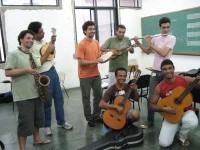 Classes and Bandao are back to normal after the shortened session last week, and in the afternoon, the time scheduled for regional rehearsals, MauricioC drops in to critique our group and is very interesting in his discussion on the importance of using the right rhythmic picking patterns for a piece – samba or maxixe or choro. He organizes our rhythm section into a more cohesive unit, and reseats us in sections. We’re beginning to sound more like a group and less like a jam session. Afterwards everyone is a little crazy though, and I snap a pic of an impromptu “instrument exchange”.
Classes and Bandao are back to normal after the shortened session last week, and in the afternoon, the time scheduled for regional rehearsals, MauricioC drops in to critique our group and is very interesting in his discussion on the importance of using the right rhythmic picking patterns for a piece – samba or maxixe or choro. He organizes our rhythm section into a more cohesive unit, and reseats us in sections. We’re beginning to sound more like a group and less like a jam session. Afterwards everyone is a little crazy though, and I snap a pic of an impromptu “instrument exchange”.
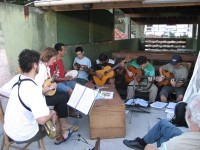 Sunday & Monday are days of errands, practice, etc., and then Tuesday – May 1st – is another holiday & we’re back rehearsing in Sta Teresa again. Marcele, Pablo’s wife, comes and takes pics & films of us. It’s a full moon and our rooftop rehearsal spot begins to look like a movie set as afternoon turns to evening. Later I go to Trapiche for the session, and so do Romulo & Raphael, so we have a band table full of the energy of a good practice.
Sunday & Monday are days of errands, practice, etc., and then Tuesday – May 1st – is another holiday & we’re back rehearsing in Sta Teresa again. Marcele, Pablo’s wife, comes and takes pics & films of us. It’s a full moon and our rooftop rehearsal spot begins to look like a movie set as afternoon turns to evening. Later I go to Trapiche for the session, and so do Romulo & Raphael, so we have a band table full of the energy of a good practice. 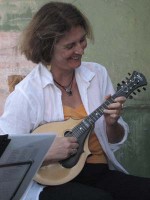
It’s an unusual night at Trapiche. Eduardo arrives late, Luiz isn’t there, but Yamandu is there with a family including 3 performing kids who play a set. Romulo says they come from the south, near Argentina. The youngest boy is a 7-string phenom. He’s so small that his guitar is nearly completely hidden by the table. His older brother plays accordion, and their sister sings and plays rhythm guitar. It’s interesting to see Yamandu solicitously setting up their mikes and getting the sound levels right. At one point he & the 7-string kid play a duet that is really flashy & fun – you can tell Y sees himself in this little guy. Maybe as a result of their long break the regular band plays a smoking last set and TaxiPaulo arrives in time to catch the end of it & take a pic of me & the boys.
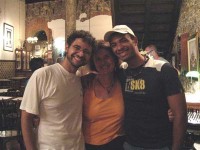 So now it’s officially May – my last month in Rio – and I’m trying not to be sad and to count myself lucky, etc. But it is really going to be hard to leave this new life in which I am so completely happy and industriously occupied. The sonnet to end this log started from a comment Marcia made at the roda in Petropolis when I said I rarely felt myself in danger in Rio. It also includes the feeling of rebirth walking to choro-school the day after the big storm, the brilliance of the sun and blue sky returning in a miraculous calm as people tidied up after the deluge. The rhyme pattern for the 6-line section at the end is different than the one I usually use, but still traditional for a sonnet. The lines seem kindof unbalanced, but at this point I like that. We’ll see
So now it’s officially May – my last month in Rio – and I’m trying not to be sad and to count myself lucky, etc. But it is really going to be hard to leave this new life in which I am so completely happy and industriously occupied. The sonnet to end this log started from a comment Marcia made at the roda in Petropolis when I said I rarely felt myself in danger in Rio. It also includes the feeling of rebirth walking to choro-school the day after the big storm, the brilliance of the sun and blue sky returning in a miraculous calm as people tidied up after the deluge. The rhyme pattern for the 6-line section at the end is different than the one I usually use, but still traditional for a sonnet. The lines seem kindof unbalanced, but at this point I like that. We’ll see
she said no but you are simple so no-
one would think you are an American
a compliment that I don’t understand
fully because I’m complicated so
being simple is somehow a disguise
but she’s right my life has untangled here
in many ways and the ground’s been swept clear
of obstacles it’s a pleasant surprise
to be simple and happy becomes me
and I am radiantly content to
walk along these rain-soaked sidewalks in my
new flip-flops hair permanently frizzy
from wind and sun under such a clear blue
sky that even a damaged dream could fly
Bjs.
m
